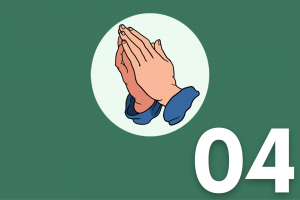Shabbat Shalom everyone! My name is Peter. Today is the 11th day of the 3rd month, year 5783; June 10th, 2022, and welcome to the Our Heavenly Father podcast.
In today’s episode, we’ll be talking about the last 5 of The Ten Commandments which focus on our fellow human beings and how we are to live together with them.
In prior episodes, we talked about how having free will reveals a loving Heavenly Father and how He Himself gave instructions for all of humankind, and how those instructions have been preserved for us over the past three thousand years. How an all-powerful and all-knowing Heavenly Father gave us truly eternal Instructions that we can only obey within a covenant relationship with our Creator. In our last episode, we learned about how the first five commandments relate to our Heavenly Father and how we are to obey and represent Him.
In part two of the Ten Commandments, we will be talking about how our Heavenly Father expects us to treat those around us, who are also created in God’s image, and whom He loves just as much as us.
Samson Hirsch tells us,
“If God is the sole Master of your fate, and if He is to be the sole Guide of all your actions, then each and every one of your fellow men, too, must likewise be under His care, and any action you take against your fellow man will come under His observation.”
The 6th commandment states,
“You shall not kill.”
The Hebrew word ratsach here is often used for murder; however, the Dictionary of Classical Hebrew, the Lexham Research Lexicon, and the Brown-Driver-Briggs Lexicon all acknowledge that the word can also refer to an accidental killing.
In the late 20th century, the majority of translations changed “kill” to “murder”, which turn this into a commandment that only prohibits unlawful killings; this means that humankind would then decide for itself under what circumstances the killing of another human being would be lawful.
So, what does the Bible tell us?
After the Flood, which destroyed all of humankind, because the earth was filled with violence, God said to Noah, in Genesis 9:6,
“Whoever sheds man’s blood, by man shall his blood be shed; for in the image of God made He man.”
God tells us here that we cannot kill another human being. Why? Because we are all made in the image of God. Killing is therefore an act of violence, against God Himself, which is why this commandment comes first and foremost. This also tells us that the power over life and death is in God’s hands and His hands alone; and that by taking a life, one puts themselves in the place of God.
So, what about accidentally or indirectly causing the death of another human being?
Deuteronomy 22:8 tells us,
“When you build a new house, then you shall make a parapet for your roof, that you bring not blood upon your house if any man falls from there.”
And Numbers 35:22-25 says,
“But if he thrust him suddenly without enmity, or hurled upon him anything without lying in wait, or with any stone, whereby a man may die, seeing him not, and cast it upon him, so that he died, and he was not his enemy, neither sought his harm; then the congregation shall judge between the smiter and the avenger of blood according to these ordinances; and the congregation shall deliver the manslayer out of the hand of the avenger of blood, and the congregation shall restore him to his city of refuge, where he had fled; and he shall dwell there until the death of the high priest, who was anointed with the holy oil.”
And Numbers 35:32 continues,
“And you shall take no ransom for him that has fled to his city of refuge, that he should come again to dwell in the land, until the death of the priest.”
Here we see that an accidental killing results in bloodguilt, which has the consequence of having to flee to and live in a city of refuge until the death of the high priest redeems them from their unintentional sin. It reveals to us that the sanctity of life must be held in the highest regard; and that measures should be taken to protect human life from even accidental death.
What about the execution of someone in a capital crime? Would those witnesses to the crime, who participate in the execution of a criminal also then incur blood guilt?
As Leviticus 24:14 says,
“Take the blasphemer outside the camp, and have all who heard him lay their hands on his head; then have the whole assembly stone him.”
The laying on of hands here transfers the anticipated bloodguilt of those witnesses onto the victim. We see a similar process of the laying on of hands to transfer sin in Leviticus 16:21, which says, regarding the scapegoat,
“He shall lay both his hands on its head and confess over it all the iniquities of the Israelites and all their acts of rebellion, that is all their sins; he shall lay them on the head of the goat and send it away into the wilderness”
This tells us that even in the execution of a criminal, those witnesses executing that judgment will incur bloodguilt that must be transferred back onto the criminal.
There is one case where the Bible tells us that bloodguilt will not be incurred, which is Exodus 22:1, where it says,
“If a thief is found breaking in, and be smitten so that he dies, there shall be no bloodguiltiness for him. If the sun be risen upon him, there shall be bloodguiltiness for him”
The JPS Torah Commentary says,
“Because the burglar is likely to encounter the occupants and must anticipate that they will use force, his nocturnal timing creates a presumption of homicidal intent. The condition of imminent threat, necessary to satisfy lawful self-defense by the householder, is thus fulfilled. Hence, no bloodguilt is incurred should the intruder be killed.”
This special case deals with a thief the breaks in during the night, and not during the day.
The Bible tells us that God hates violence, as Psalms 11:5 says,
“God tests the righteous; but the wicked and him that loves violence His soul hates.”
King David was a man after God’s own heart, and yet, as David himself says in 1 Chronicles 22:8,
“But the word of God came to me, saying: You have shed blood abundantly, and have made great wars; you shall not build a house unto My name, because you have shed much blood upon the earth in My sight.”
God’s house would therefore be a house associated with peace and not war and violence; even though David was the apple of God’s eye, he could not be the one to build God’s house.
God’s rebuke of Cain in Genesis 4:10 says,
“What have you done? The voice of your brother’s bloods cries to me from the ground.”
The plural of the Hebrew word for blood here expresses to us that it was not only Abel that Cain killed, but all of Abel’s future descendants as well; so the killing of another human being is not just the death of one person, but rather, the death of countless descendants after them as well.
A frequent consequence of killing is that it can lead to a cycle of vengeance, with people taking matters into their own hands, instead of leaving it to God; something which has led to wars and blood feuds that can go on for generations.
God Himself says in Deuteronomy 32:35,
“Vengeance is Mine, and recompense, against the time when their foot shall slip; for the day of their calamity is at hand, and the things that are to come upon them shall make haste.
Forgiveness is the only thing that can break this cycle of vengeance; of hatred and bitterness. We must remember that none of us are truly innocent in God’s eyes — we must forgive others as God forgives us. In the end, God will ensure that justice is done and that everyone who has shed innocent blood on the earth will be punished.
As Isaiah 26:21 says,
“For, behold, God comes forth out of His place to visit upon the inhabitants of the earth their iniquity; the earth also shall disclose her blood, and shall no more cover her slain.”
We must ultimately trust God to carry out judgment against those committing evil, and we must learn to forgive; because, if we don’t, then we will end up taking vengeance into our own hands; returning evil for evil. We must trust that God will right all wrongs; if not in this world, then in the world to come.
As 1 Samuel 2:8 says,
“He raises the poor out of the dust, He lifts up the needy from the dung-hill, to make them sit with princes, and inherit the throne of glory”
“And I will execute vengeance in anger and fury upon the nations which have not listened.”,
Micah 5:15
God hereby tells us that the intentional killing of another person, created in God’s image (however justified), is punishable by death.
The 7th commandment states,
“You shall not commit adultery.”
The Hebrew word naw-af’ is most frequently associated with having sex with someone other than your partner, but to better understand this commandment, we must look more closely.
Ezekiel 23:37 says,
“For they have committed adultery, and blood is in their hands, and with their idols have they committed adultery; and their sons, whom they bore unto Me, they have also set apart unto them to be devoured.”
And Jeremiah 3:9 says,
“… she (Israel) polluted the land and committed adultery with stones and with wood.”
The Lexham Analytical Lexicon infers the meaning here to be, “to act unfaithfully or treacherously”, but it is both acting unfaithfully and acting treacherously.
Why is it also treacherous?
Because it is done secretly while in a covenant relationship with someone else; and, in doing so, it shows contempt for the one that is being mistreated.
Adultery is the abandonment of our part of an agreement that we’ve made with someone else; one that is supposed to be based on mutual love and respect is now surrounded by lies and deception. It is the forsaking, not just of our obligations, but of the other party who loves us, wants to protect us, and truly just wants the best for us — an act that displays contempt for the other party.
When a man and a woman have a sexual union, God’s blessing on this union is children — a family. Adultery destroys the sanctity of this union, and can lead to children that are not the husband’s, and in many cases to broken families with fatherless children.
This commandment is about being unfaithful to a spouse while married to them; not those who have divorced and remarried. However, we must remember that although God permits divorce, God never intended for people to divorce.
God also tells us that adultery is an offense punishable by death.
The 8th commandment states,
“You shall not steal.”
The Hebrew word (gaw-nab’) means to steal or take away; but, it can also mean, as the Lexham Analytical Lexicon states,
“to kidnap: to take someone away to an undisclosed location against a person’s will, often for use as a slave or for other monetary profit.”
We can infer from the importance of these ten commandments, that
“You shall not steal”
does not refer to someone’s property; but rather, to things that impact another human being’s life and liberty. Our Heavenly Father gave each of us free will and a world so that we might, within the limits of His commandments, live life. When someone encroaches on the liberties of another’s freedoms, God’s penalties are severe indeed.
As Deuteronomy 24:7 says,
“If a man be found stealing any of his brothers of the children of Israel, and he deals with him as a slave, and sells him; then that thief shall die; so shall you put away the evil from the midst of you.”
Although this passage says, “children of Israel”, we must remember that Israel was chosen to be the bearer of God’s instructions and to be an example to the rest of the world; so, this is God telling everyone, that making another human being a slave is an offense punishable by death.
Our rights and freedoms are God-given, and stealing them from another is a grave tragedy — it is the cause of great sufferings, and something the Israelites experienced firsthand as slaves of the Egyptians from which they learned to never mistreat the strangers in their land.
The 9th commandment states,
“You shall not bear false witness against your neighbor.”
This commandment includes both false testimony and false witnesses; in other words, testimony about what was witnessed that was not true, and/or someone who was not a witness to the events.
A false witness infringes on the rights and freedoms of another individual, and is, therefore, a very serious offense; even to the execution of the witness in a capital case.
As Deuteronomy 19:16 says,
“If an unrighteous witness rises up against any man to bear perverted witness against him; then both the men, between whom the controversy is, shall stand before the LORD, before the priests and the judges that shall be in those days. And the judges shall inquire diligently; and, behold, if the witness is a false witness, and has testified falsely against his brother; then shall you do unto him, as he had purposed to do unto his brother; so shall you put away the evil from the midst of you.”
Proverbs 25:18 describes a false witness thus,
“As a hammer, and a sword, and a sharp arrow, so is a man that bears false witness against his neighbor.”
In Proverbs 6:19,
“A false witness that breathes out lies” is listed as one of the seven things that are an abomination to God.
The 10th commandment states,
“You shall not covet your neighbor’s house; you shall not covet your neighbor’s wife, nor his man-servant, nor his maid-servant, nor his ox, nor his donkey, nor anything that is your neighbor’s.”
God created the universe. He then created us, placed us on the earth, and gave us dominion over all the earth. What He did not do was give us ownership over any of His creation; not even a single atom. He made us stewards over His creation to cultivate it and watch over it. We may have possession of many things, but they ultimately do not belong to us — everything is God’s. As stewards, we should therefore be grateful and thankful for the things that we’ve been given; but even more so, we must also be responsible in using what we’ve been given to help those in need around us.
When we are not satisfied with what we have, even resentful; then we may feel that we have a right to what others have been given, and thus, break these commandments in order to obtain what we believe should have been ours. Since God created the universe, Kingdoms have been formed, wars fought, and countless people have been killed or enslaved over that which others have desired to possess; yet, none of those things were ever theirs to take.
In the story of Ahab, king of Samaria,
Ahab had offered to buy the vineyard of his neighbor Naboth, but Naboth refused to sell it to him. Then Ahab became sullen and angry, laid down in his bed, and refused to eat; such that his wife Jezebel told him to get up, eat some food, and be cheerful, because she would get him Naboth’s vineyard. Now how did Jezebel get the vineyard for Ahab? She got it for him by hiring two men to be false witnesses against Naboth for blasphemy, leading to Naboth’s death; so, she in turn violated both the commandment against killing and giving false testimony in order to get what Ahab so earnestly desired that he fell into depression.
We must remember, and never forget, that the violation of this final and most important commandment, ultimately leads to violation of one or more of all the rest. We should thank our Heavenly Father always for what He has given us and continues to provide for us daily.
And Exodus 20:15 continues with,
“And all the people perceived the thunderings, and the lightnings, and the voice of the horn, and the mountain smoking; and when the people saw it, they trembled, and stood afar off. And they said unto Moses: ‘Speak with us, and we will hear; but let not God speak with us, lest we die.’ And Moses said unto the people: ‘Fear not; for God is come to test you, and that His fear may be before you, that you sin not.’”
In summary, we are all made in the image of God, every individual is under the watchful eye and governance of our Heavenly Father, and any actions we take against a fellow human being will be judged both in this world and in the world to come.
This has been the Our Heavenly Father podcast.
If you enjoyed this episode, don’t forget to subscribe! And if you want to help spread the good news, please invite your friends to subscribe too.
If you have any questions, comments, or a suggestion for a future podcast, please feel free to e-mail me at peter@our-heavenly-father.com.
Thanks again for listening and I hope you’ll be back for our next podcast, Jesus: Part I.
Peace to you, and peace to your house, and peace to all that you have!
Amen







